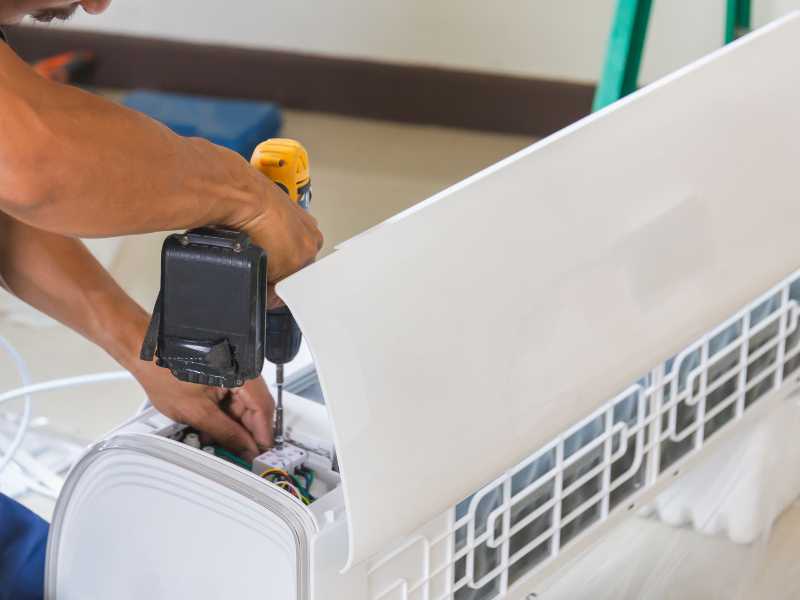HVAC Not Cooling? How to Determine if It’s Time for a Replacement
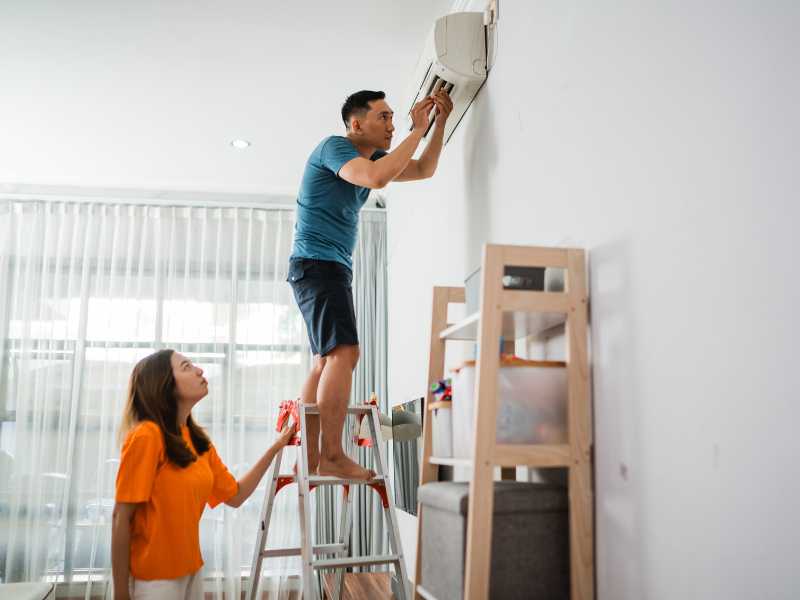
Is your home feeling more like a sauna than a cool retreat? When your HVAC system isn’t cooling like it should, it can turn your comfort upside down. Sometimes, a quick fix can solve the problem. But other times, your old cooling buddy might be telling you it’s ready to retire.
How do you know when it’s time to say goodbye to your current HVAC and welcome a new one?
This guide will help you spot the signs that your system is on its last legs. We’ll walk you through the clues that suggest an HVAC replacement might be your best bet, saving you from sweaty nights and sky-high energy bills. So, let’s dive in and learn how to tell if your HVAC is just having a bad day or if it’s time to start shopping for a new cooling companion.
Common Causes of HVAC Not Cooling and Fixes
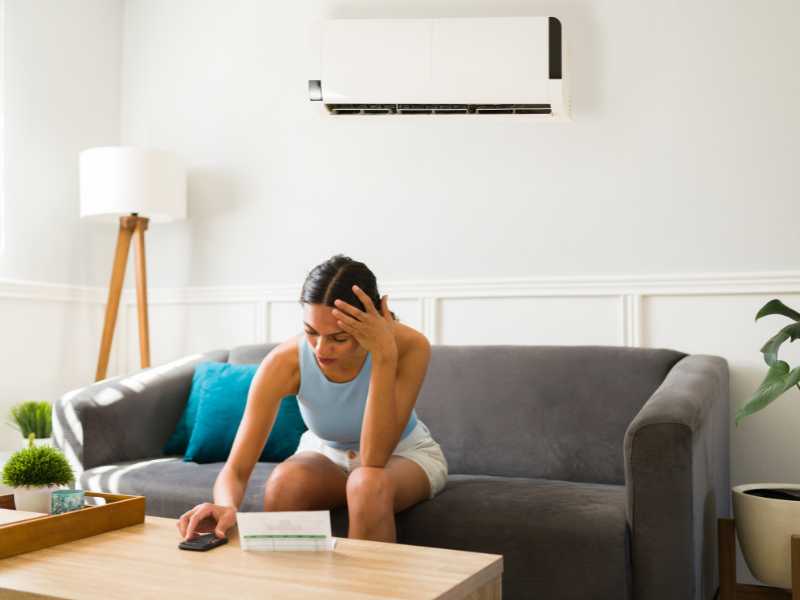
1. Dirty Air Filter
One of the most common reasons for an HVAC system not cooling properly is a dirty air filter. When the air filter becomes clogged with dust and debris, it restricts airflow, making it difficult for your system to blow cold air effectively. This reduced airflow can lead to the system working harder, increasing wear and tear, and ultimately reducing its lifespan.
Solution: Check your air filter every month and replace it if it appears dirty. A clean air filter promotes optimal airflow and supports the efficient operation of your HVAC system.
2. Refrigerant Leak
Refrigerant is the substance that absorbs and releases heat in your HVAC system, allowing it to cool the air. If there is a refrigerant leak, your system won’t have enough refrigerant to cool the air effectively, leading to warm air blowing from your vents. Signs of a refrigerant leak include hissing sounds, ice formation on the evaporator coil, and decreased cooling efficiency.
Solution: If you think there might be a refrigerant leak, reach out to a professional HVAC technician to identify and fix the issue. Only a qualified professional should handle refrigerant recharging to maintain safety and efficiency.
3. Frozen Evaporator Coil
The evaporator coil is responsible for absorbing heat from the indoor air. If the coil becomes frozen, it can’t absorb heat effectively, causing the system to blow warm air. A frozen evaporator coil can result from restricted airflow due to a dirty air filter, low refrigerant levels, or other underlying issues.
Solution: Turn off your HVAC system to allow the coil to thaw and check for any airflow obstructions. If the coil continues to freeze, contact an HVAC technician to identify and resolve the root cause.
4. Condenser Coil Issues
The condenser coil, located in the outdoor unit, releases the heat absorbed by the evaporator coil to the outside air. When the condenser coil becomes dirty or damaged, it can’t release heat efficiently, causing the system to struggle with cooling your home.
Solution: Regularly inspect and clean the condenser coil. Use a garden hose to gently remove dirt and debris from the coil. If the coil is damaged, seek professional help for HVAC repair or replacement.
5. Thermostat Settings
Incorrect thermostat settings can also cause your HVAC system to blow warm air. Ensure that your thermostat is set to the desired temperature and that it’s set to “cool” mode. Additionally, check the fan settings; if the fan is set to “on” instead of “auto,” it may blow air even when the system isn’t cooling.
Solution: Verify and adjust your thermostat settings to ensure they are correct. If you continue to experience issues, consider having your thermostat calibrated or replaced by a professional.
6. Blocked Condensation Drain Hose
The condensation drain hose removes excess moisture from the HVAC system. If this hose becomes clogged, it can cause water to back up into the system, leading to reduced cooling efficiency and potential damage to components.
Solution: Regularly inspect the condensation drain hose for blockages and clear any debris. If you’re unsure how to do this, an HVAC technician can help ensure the hose is properly maintained.
When to Repair vs. Replace Your HVAC System
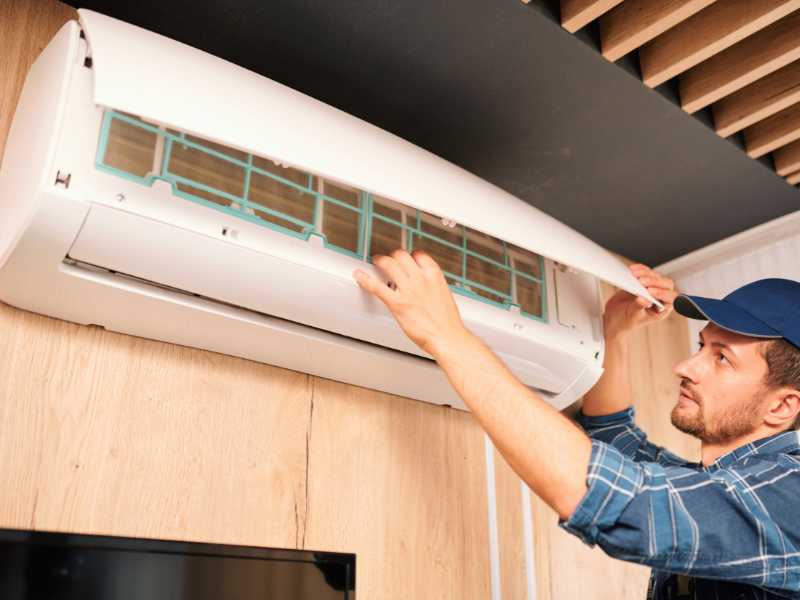
1. Age of the Unit
The age of your HVAC unit is a significant factor in deciding whether to repair or replace it. Most HVAC systems have a lifespan of 10-15 years. As the unit ages, it becomes less efficient and more prone to breakdowns. If your system is nearing the end of its lifespan and frequently needs repairs, it may be more cost-effective to replace it with a newer, more efficient model.
Consideration: If your HVAC system is over 10 years old and has a history of frequent issues, it might be time to consider a replacement. Newer systems offer better energy efficiency, which can save you money on utility bills in the long run.
2. Frequent Repairs
If you find yourself constantly calling for HVAC repairs, it could be a sign that your system is on its last legs. Frequent repairs not only add up in cost but also indicate that the system may no longer be reliable. Instead of pouring money into a failing system, investing in a new unit can provide peace of mind and improved performance.
Consideration: Track the frequency and cost of repairs over the past few years. If repair costs are approaching the price of a new unit, replacement is likely the smarter choice.
3. Inefficiency
An inefficient HVAC system will struggle to cool your home adequately, leading to increased energy consumption and higher utility bills. Signs of inefficiency include longer cooling times, uneven cooling throughout your home, and rising energy costs.
Consideration: Compare your current energy bills with those from previous years. A significant increase in costs could indicate that your HVAC system is no longer operating efficiently. Upgrading to a modern, energy-efficient system can reduce your energy consumption and costs.
5 Easy Steps to Diagnose HVAC Problems
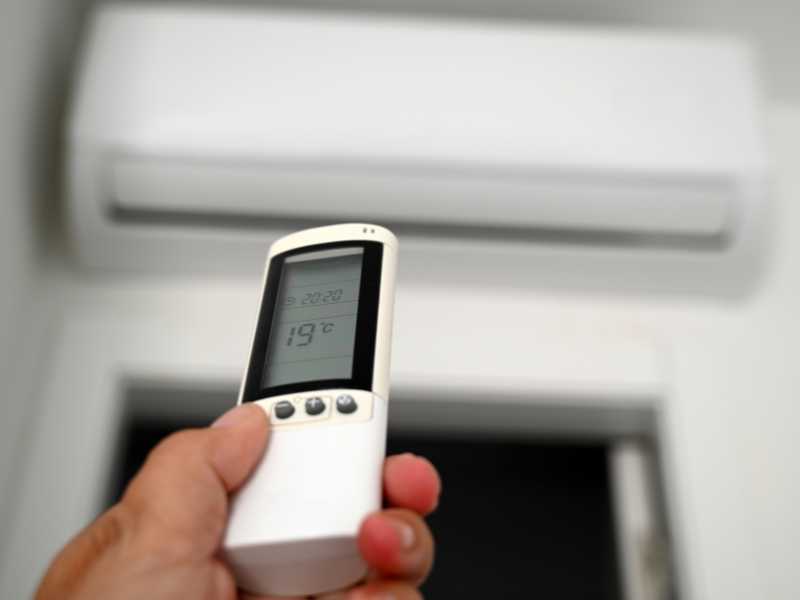
1. Check the Air Filter
A dirty air filter is one of the simplest and most common issues that can cause your HVAC system to stop cooling effectively. Reduced airflow due to a clogged filter can lead to various problems, including frozen evaporator coils and overworked fan motors.
How to Check:
- Turn off the HVAC system.
- Locate the air filter, typically found in the return air duct or the air handler.
- Remove the filter and inspect it for dirt and debris.
- If the filter is dirty, replace it with a new one. Ensure you choose the correct size and type for your system.
Regularly replacing the air filter can significantly improve your HVAC system’s performance and lifespan.
2. Inspect the Thermostat Settings
Incorrect thermostat settings can cause your HVAC system to blow warm air. Ensure that your thermostat is set to the desired temperature and the correct mode.
Steps:
- Verify that the thermostat is set to “cool” mode.
- Check the temperature setting to ensure it’s lower than the current room temperature.
- Inspect the fan settings. The fan should be set to “auto” rather than “on” to ensure it only runs during cooling cycles.
If the thermostat appears to be malfunctioning, consider replacing it with a programmable or smart thermostat for better control and energy efficiency.
3. Examine the Outdoor Unit
The outdoor unit, which houses the condenser coil, can become obstructed by debris, impacting the system’s ability to release heat.
How to Inspect:
- Turn off the power to the HVAC system.
- Remove any leaves, grass, or debris around the outdoor unit.
- Use a garden hose to gently wash the condenser coil, removing dirt and grime.
- Ensure the unit has at least two feet of clearance on all sides for proper airflow.
Regular maintenance of the outdoor unit can help prevent performance issues and extend the life of your HVAC system.
4. Look for Refrigerant Leaks
Refrigerant leaks can significantly impact your HVAC system’s cooling ability. Signs of a refrigerant leak include hissing sounds, ice on the evaporator coil, and reduced cooling performance.
Steps:
- Listen for unusual sounds, such as hissing or bubbling, near the indoor or outdoor units.
- Inspect the evaporator coil for ice buildup.
- If you suspect a leak, contact a professional HVAC technician. Refrigerant handling requires special training and certification.
A professional can locate and repair the leak and recharge the refrigerant to the proper levels.
5. Assess the Evaporator Coil and Condenser Coil
Both the evaporator coil (inside the air handler) and the condenser coil (in the outdoor unit) are crucial for heat transfer and cooling efficiency.
How to Check:
- Turn off the HVAC system.
- Inspect the evaporator coil for dirt, dust, and ice buildup.
- Check the condenser coil for similar issues.
- Clean the coils if they are dirty, using appropriate methods and cleaners.
If the coils are damaged or heavily corroded, a professional technician may need to replace them.
When to Call a Professional HVAC Technician
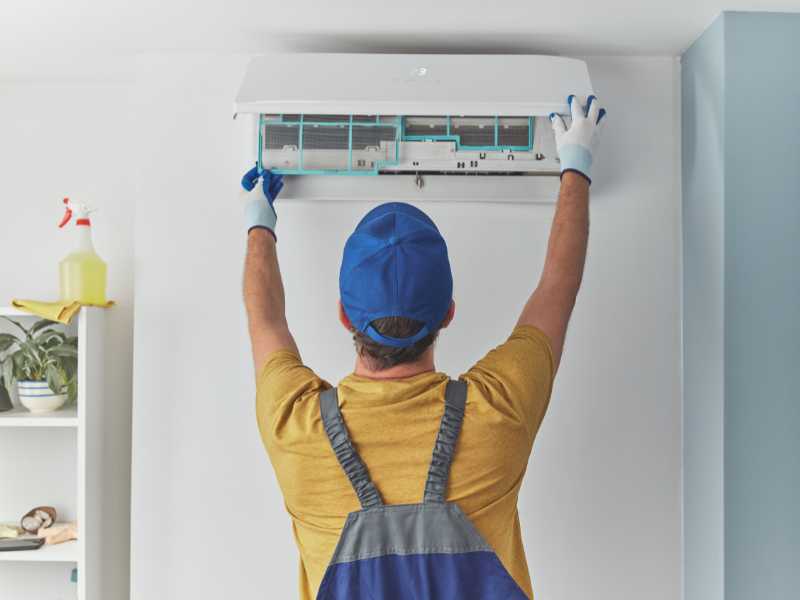
Complex Repairs
Some HVAC issues are too complex or dangerous for DIY solutions. Problems such as refrigerant leaks, electrical issues, or compressor malfunctions require professional expertise.
When to Call:
- If you suspect a refrigerant leak.
- When there are electrical problems, such as a tripped circuit breaker or wiring issues.
- If the compressor or fan motor has failed.
- When DIY fixes do not resolve the cooling issues.
Professional HVAC technicians have the skills and tools to safely and effectively address these problems.
Comprehensive HVAC System Inspection
Regular professional inspections can prevent minor issues from becoming major problems. An HVAC technician can perform a thorough system check, ensuring all components are functioning correctly.
Benefits:
- Early detection of potential issues.
- Improved system efficiency and performance.
- Extended lifespan of your HVAC system.
- Peace of mind knowing your system is in optimal condition.
Scheduling annual maintenance with a qualified HVAC professional can help keep your system running smoothly and efficiently.
Final Thoughts
When your HVAC isn’t cooling as it should, it can be more than just uncomfortable—it can be a sign of bigger issues. We’ve walked through common problems, from dirty filters to refrigerant leaks, and outlined steps you can take to diagnose and sometimes fix these issues yourself. Remember, regular maintenance like changing filters and keeping outdoor units clean can prevent many cooling problems.
However, know your limits. While some troubleshooting can be done on your own, complex issues involving refrigerants, electrical components, or major parts like the compressor require professional expertise. Don’t hesitate to call in an HVAC technician when needed—their skills can save you time, money, and headaches in the long run.
If your system is old, inefficient, or constantly needing repairs, it might be time to consider a replacement. Investing in a modern, energy-efficient HVAC system can ensure consistent cooling, reduce energy costs, and enhance comfort for many years ahead.
By staying proactive with maintenance, addressing issues promptly, and knowing when to seek professional help, you can keep your home cool and comfortable, no matter what the weather brings.
Get Help from Callidus Air today
Don’t let HVAC troubles leave you sweating! At Callidus Air, we’re committed to keeping your home cool and comfortable all year round. Our expert technicians are ready to diagnose, repair, or replace your HVAC system with precision and care. Whether you need a quick fix or it’s time for an upgrade, we’ve got you covered.
Frequently Asked Questions About HVAC Not Cooling
1. Why is my HVAC not blowing cold air?
Several issues can cause an HVAC system to stop blowing cold air, including a dirty filter, low refrigerant levels due to a refrigerant leak, a frozen evaporator coil, or a malfunctioning thermostat. Regular maintenance and timely repairs can help keep your HVAC system properly cooling your home.
2. How can I tell if my air conditioning unit needs a new air filter?
Check the air filter monthly. If it’s visibly dirty or clogged, it needs replacing. A dirty filter restricts airflow, preventing the air conditioning unit from blowing air effectively and cooling your home adequately.
3. What should I do if my AC unit is blowing warm air instead of cool air?
If your AC unit is blowing warm air, check the thermostat settings, air filter, and outdoor condenser unit. Ensure the outdoor coil is clean and not obstructed. If the issue persists, you may need to contact an HVAC technician to inspect for refrigerant leaks or compressor issues.
4. Why does my central air conditioning system frequently cycle on and off without cooling my home?
Frequent cycling without adequately cooling can be caused by a dirty filter, thermostat issues, or an oversized or undersized system. It may also indicate a problem with the air conditioner’s compressor or refrigerant levels. A professional inspection can diagnose and resolve the issue.
5. How often should I schedule maintenance for my central air conditioner?
It is recommended to schedule professional maintenance for your central air conditioner at least once a year. Regular maintenance ensures the entire system, including indoor and outdoor units, is functioning properly and helps prevent issues like blowing warm air.
6. What are the signs of a refrigerant leak in my HVAC system?
Signs of a refrigerant leak include reduced cooling efficiency, ice formation on the evaporator coil, hissing or bubbling sounds, and warm indoor air when the system is running. If you suspect a refrigerant leak, contact an HVAC professional for repair.
7. Can a clogged condensation drain affect air conditioning systems?
Yes, a clogged condensation drain can cause water to back up into the system, reducing its efficiency and potentially damaging components. Regularly inspect and clear the drain to ensure your AC system is properly cooling your home.
8. Why is my outdoor condenser unit making unusual noises?
Unusual noises from the outdoor condenser unit can indicate issues such as a failing condenser fan, loose components, or debris inside the unit. Turn off the system and inspect the unit. If the problem persists or your HVAC continues to make noise, contact a technician for a thorough inspection.
9. What should I do if my air conditioner is not running at all?
If your air conditioners are not running, check the thermostat setting, circuit breaker, and power supply. Ensure the thermostat is set to “cool” and the desired temperature. If the problem continues, you may have a tripped circuit breaker, a blown fuse, or a failed compressor.
10. How can I improve the efficiency of my HVAC system?
Improve your HVAC system’s efficiency by regularly replacing air filters, keeping the outdoor unit clear of debris, scheduling annual maintenance, and using a programmable thermostat to optimize thermostat settings. Ensuring your system is adequately cooling and functioning properly can reduce energy consumption and extend the system’s lifespan.

